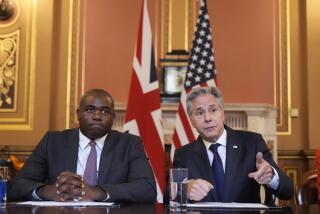17 Seized in Plot to Sell Iranians U.S. Weapons
NEW YORK — Federal authorities on Tuesday charged 17 people--including a defendant reputed to be a retired Israeli army general--with plotting to sell more than $2-billion worth of sophisticated American weapons to Iran. They called it the largest illegal munitions case ever brought in the United States.
The deal would have included missiles, fighter planes, helicopters, howitzers, cluster bombs, aircraft engines, recoilless rifles, radar sets, transport planes and other military hardware.
To gain State Department export approval, the suspects allegedly planned to misrepresent the final destination of the weapons. Some were to be shipped to Iran from Israel and some from the Philippines. Selling U.S.-made weapons to Iran is illegal.
‘Mind-Boggling in Scope’
U.S. Atty. Rudolph W. Giuliani said the scheme was “mind-boggling in scope.”
Prosecutors identified the reputed Israeli general as Avraham Bar-Am, 52, and said he was arrested Monday along with four others in Bermuda where one phase of the arms negotiations was about to be concluded. Court papers described Bar-Am as a 30-year veteran of the Israeli army who is currently in the reserve officer corps in an advisory position for Israel’s Northern Army Command.
Giuliani said it was not known whether the Israeli government was aware of the planned large-scale diversion of arms to Iran. Customs Commissioner William von Raab said Israeli authorities had not been asked to take part in the investigation.
“The Iranians would have used these weapons to war against their neighbors or to spread international terrorism against the free West,” Von Raab said. But prosecutors said that none of the weapons actually reached Iran.
A central figure in the cluster of arms schemes, according to court papers, was Cyrus Hashemi, an Iranian national and banker who was indicted in July, 1984, on charges of illegally selling military supplies to Iran during the hostage crisis. He was not charged in the current case, and authorities declined to disclose whether he was a cooperative witness. But, as in previous arms arrests, the government managed to plant an undercover operative in the midst of the alleged scheme.
Among those arrested and charged with taking part in the plan to ship weapons from Israel to Iran was Nickos Minardos, of Beverly Hills. Minardos and three others were seized Monday after they attended meetings in New York to conclude their negotiations, prosecutors said.
8 Others Sought
Complaints filed in federal court in Manhattan charged that five conspiracies were involved in the Iranian weapons scheme. The nine men arrested Monday included three Israelis and two West Germans. Eight others, including citizens of Greece, West Germany and France, were being sought.
“You’ve heard of the merchants of death?” Von Raab asked. “These people were the brokers of death. They would have operated a flea market of death.”
“This is the largest illegal export of arms in the United States,” Janet Rapaport, a Customs Service spokeswoman, said.
Hours before the indictments were announced by prosecutors in Manhattan, U.S. Atty. Gen. Edwin Meese III delivered a speech in New York City. “This (illegal munitions shipments) is a major priority right now of the Customs Service, of the U.S. attorneys’ offices,” Meese said. “I think you’ll find that these cases are being investigated and prosecuted with a great deal of regularity.”
In addition to Hashemi, federal officials said a central figure in the conspiracies was Samuel Evans, 50, an American lawyer living in London, who was arrested in Bermuda. According to court documents, Evans allegedly located three groups of people who could obtain U.S. weapons abroad, along with the necessary shipping documents.
Certificate Required
Under law, the State Department must approve the resale to a new buyer of military hardware manufactured in the United States. The seller must obtain an end-user certificate certifying that the weapons are destined for a particular nation. The State Department will not approve shipments to nations such as Iran, where providing U.S. arms would be contrary to the security of the United States.
According to the indictment, the groups Evans located planned to misrepresent the ultimate destination for the munitions.
The indictment said the conspiracy involving the defendant reputed to be Gen. Bar-Am began in January when another defendant, William Northrop, said he could obtain weapons to be sold to Hashemi. Northrop claimed to be able to get the arms from Northrop Corp. On Feb. 23, Evans, the indictment said, received a copy of a letter purportedly written by C. Robert Gates, Northrop’s senior international vice president. The letter listed types and quantities of military equipment available to Evans.
No Evidence Against Firm
But at a news conference announcing the indictments Tuesday, both Giuliani and Von Raab said there was no evidence Gates or Northrop Corp. were actually involved in the weapons scheme. A Northrop Corp. spokesman said the company also was not aware of any connection between William Northrop and the corporation. The spokesman said that Gates had no knowledge of the defendant Northrop and had no correspondence with him.
As part of the scheme, William Northrop said that Gates had written the letter on a personal basis and there was no official channel from the company. The list included 13 aircraft. After further negotiations, Evans said that Northrop and his partner, Gen. Bar-Am, wanted to meet with Hashemi to complete the deal.
Three days later, an undercover customs agent met with Evans, Northrop and Bar-Am. Prosecutors charged that Evans produced a draft of a contract and that the final price to be negotiated for the weapons was $343 million.
Staff writer Gaylord Shaw in Washington also contributed to this story.
More to Read
Sign up for Essential California
The most important California stories and recommendations in your inbox every morning.
You may occasionally receive promotional content from the Los Angeles Times.










